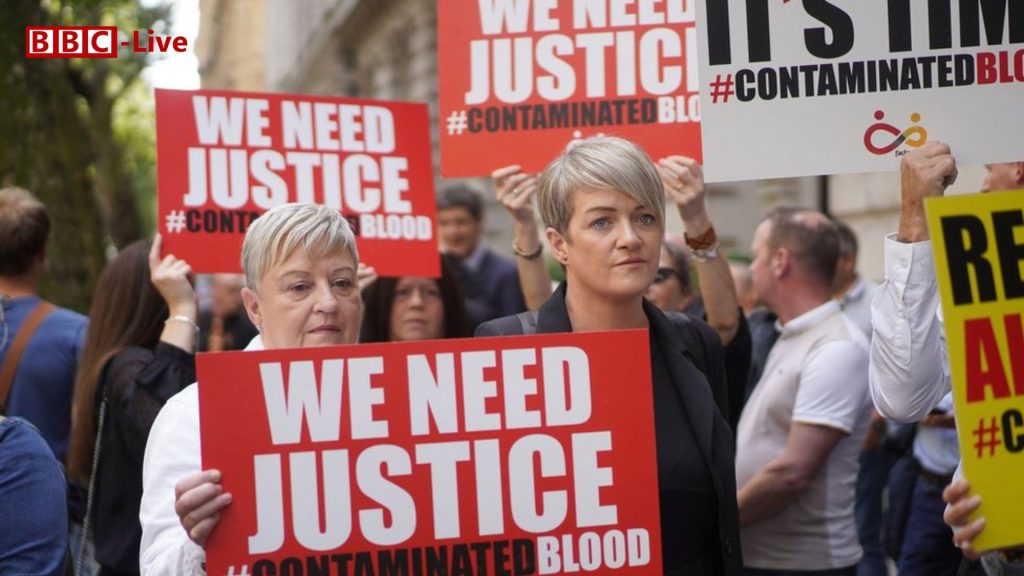
Infected Blood Scandal Victims Still Struggling For Justice
Ongoing Tragedy for Victims
The Infected Blood Scandal is a tragic issue affecting thousands of victims. Many have been waiting for decades for justice. Promises have been made by both Conservative and Labour governments. However, the pace of compensation has been painfully slow. Campaigners report that only 10 out of 4,000 eligible victims have received compensation under a new scheme. To make matters worse, as of December, just 17 people had been invited to apply, despite the scheme’s launch.
The Origins of the Scandal
This scandal came to light in the 1970s and 1980s. It involved the distribution of contaminated blood products to hemophiliacs and others needing transfusions. The result was a tragic spread of HIV and hepatitis C. Many people suffered, and thousands of lives were lost. An estimated 3,000 people have died due to this scandal. Others continue to live with serious health consequences.
A Critical Inquiry
In May 2023, a significant inquiry report was released. Sir Brian Langstaff led the Infected Blood Inquiry. The report suggested that this tragedy could have been largely prevented. It recommended creating a more comprehensive compensation scheme with larger payouts for victims. Survivors saw this recommendation as a beacon of hope. They had fought for justice for decades, and they hoped this would finally bring closure.
Disappointment and Frustration
The reality has been very different. Campaigners have expressed their anger and frustration. They say the government has moved the goalposts and ignored the needs of victims. Andrew Evans chairs the group Tainted Blood. He was diagnosed with HIV after receiving contaminated blood products at 12 years old. Evans explained that government promises have proven to be empty.
He highlighted that while some progress was promised by the end of 2024, little has been achieved. By then, compensation was expected to be paid to those infected. Victims’ estates were projected to receive payments in 2025 for those who have passed away. Yet, only a small number of victims have received compensation. Many have not even had the chance to register. Evans noted that the slow pace of action has severe consequences. People continue to die at a rate of two per week. By March 2025, Evans estimates that only around 250 victims will have received compensation. Meanwhile, another 80 may die without seeing any justice.
Families in Distress
The situation is even worse for families of victims. Many parents, siblings, and partners are waiting for recognition and compensation. Unfortunately, due to the long delays, they are aging and dying without receiving the justice they deserve.
Clive Efford is a Labour MP. He is also the chair of the all-party parliamentary group on the infected blood scandal. Efford expressed his dismay at the government’s handling of this situation. After a recent meeting with officials, he stated that the process felt like a “token gesture.” Victims are treated dismissively. The frustration among victims is palpable. Campaigners feel the meetings were not only ineffective but also insulting. Efford pointed out that ministers and civil servants had an opportunity to show compassion and transparency but failed to do so.
Recommendations Ignored
Sir Brian Langstaff’s report also suggested that organizations supporting victims should receive necessary resources. These organizations help victims navigate the compensation process. However, campaigners have noted that little progress has been made in this area.
Personal Struggles of Victims
Kevin Roberts, a 52-year-old victim from Hayle, Cornwall, shared his ongoing struggles. He contracted hepatitis A, B, and C as a child through contaminated blood products. Despite his efforts, he has not received any compensation. Roberts is concerned that the compensation process will continue to move slowly. He fears that victims will only receive small payments over a long time and that some might never see justice.
Government’s Commitment to Justice
In response to rising frustration, Paymaster General Nick Thomas-Symonds made a statement. He said that the government is fully committed to delivering justice for victims of the scandal. He noted that the Infected Blood Compensation Authority has been established. Additionally, an £11.8 billion budget has been allocated for victims. More than £1 billion in interim payments has already been made. Final compensation payments are now beginning to be processed. Thomas-Symonds emphasized the government’s dedication to bringing justice to victims as quickly as possible.
Seeking Closure After Decades of Pain
Despite these statements, many victims feel that the government’s efforts are insufficient. The slow pace of compensation continues to fuel anger and disappointment. Members of the infected blood community are desperately seeking closure after decades of pain, suffering, and betrayal. It remains uncertain whether the government will fulfill its promises and provide the justice that these victims have waited so long for. The fight for recognition and fair compensation continues




